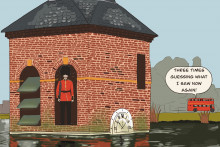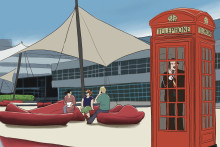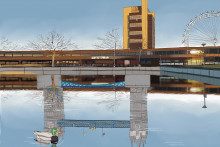On January 12th 2020 philosopher Ad Verbrugge and Victor van der Chijs, then chair of the Executive Board, sit opposite one another at the renowned television programme Buitenhof to debate English as the lingua franca at the university. It is a momentary climax to a media firestorm that lasted weeks on end regarding the introduction of English as the language of instruction at the UT. ‘A lot of indignation about the University of Twente's language policy, where, according to critics, as of January 1st Dutch may only be spoken at the coffee machine,’ proclaims Rob Trip somewhat smugly in his introduction.
'The issues we deal with in our education do not stop at the borders'
In his response, Van der Chijs directly attempted to calm down the tempers. ‘At the coffee machine, people still chat in Dutch after January 1st,’ the chair of the Executive Board stressed. ‘An impression has been created that the language police will drive around our beautiful campus blaring their sirens, yet the opposite is true. But we do think it is important that international students and staff can have their say. That is why we have made agreements on the language of administration.’ Soon the discussion moves to the language of education. ‘The issues we deal with in our education do not stop at the borders,’ states Van der Chijs. ‘Our students will end up working in international organisations. We get requests from students themselves: offer our education in the language we will later work with.’
Verbrugge parries that most graduates will 'simply' end up working within a Dutch context. According to the philosopher, who himself works at the Vrije Universiteit Amsterdam, international students and staff should instead learn Dutch as soon as possible. This promotes integration, he says. ‘By the way, I do understand the problems of a small university like Twente: universities compete among themselves for students due to the skewed funding system of higher education. They offer education in English to best serve the international market. In short, universities do it for the money.’
Needless to say: Van der Chijs and Verbrugge can but only agree to disagree that morning at Buitenhof. Although the introduction of English is causing uproar and indignation among outsiders, the transition goes without saying on campus. In the lee of the Drienerlo forest, students and staff calmly continue working as if nothing has changed – and in a way, that is true. The switch to English did not come as a bolt from the blue: it is a steady development that occurred over almost two decades. A radical disruption on 1 January 2020 is by no means the case.
‘Don't make me laugh’
But how far does this development from Dutch to English actually take us back? It is important to make a distinction between research and teaching at the UT. English has been the lingua franca for international science since the last century. Education only follows later, and moreover with baby steps. In Twente, this starts in 2002, when the 'code of conduct for vehicular languages' is adjusted and adopted by the University Council. With the new code of conduct, the UT wants to make all master's programmes accessible to international students. Incidentally, this does not mean that all master's programmes will instantaneously make the transition to English. ‘It is a phased process,’ policy officer Angela Rijnhart told what was then UT News in 2002. In the years that followed, almost all UT master's programmes switched to English, apart from a few studies such as teacher programmes and Technical Medicine.
Opposition has also been present from the start. Godfried van Lieshout, the porgramme director of civil engineering, fears a loss of quality due to the introduction of English. ‘Don't make me laugh. As if a brief course can boost your language skills to match that of a native!’ he writes in a submitted piece. Or take another piece submitted right around twenty years ago: ‘It is a misconception to think that one doesn’t need to speak Dutch to function well within a Dutch society,’ states David N. Jansen of Computer Science. ‘It would be wise for foreign students to learn Dutch as quickly as possible such that they can participate in informal contacts while simultaneously integrating society.’
'We should live here with each other rather than past each other'
Educating global citizens
In the years that follow, the discussion occasionally flares up at times, only to fade out rather quickly, as shown by the U-Today's archives. What to make of this trilogy of headlines from 2007: ‘Teacher must boost English quickly’ versus ‘Teachers' English is not that bad’ and ‘Level of English is just fine’? And the discussion even reaches the Pakkerij associations during that same year, when then-rector Henk Zijm dropped by for a lunch discussion on internationalisation. ‘Foreigners are certainly welcome here, but we truly have no intention of always having to speak English here,' is the response of the student associations. Zijm parries: ‘I hope you still want to reach out to international students to involve them more in your associations. We should live here with each other rather than past each other.’
In the 00s, most master programmes gradually shift to English and with Creative Technology and Advanced Technology, the first fully English taught bachelor programmes are also born. But it is only after the arrival of Van der Chijs and Brinksma that the UT puts great effort in advancing the use of the English language. The first cracks in the dam are visible in the 2013 introductory interview with president of the Executive Board Van der Chijs in UT News magazine. ‘If you don't take the Germans into account, our percentage of international students is shockingly low, between 3 and 4 per cent. We are lagging behind. A university has to educate global citizens. That means one needs to be among foreign students in the lecture halls.’
'We didn't accept that the Execute Board said: All programmes will be taught in English, and that’s that'
Painstaking
Before long, the internationalisation vision 2015-2020 was published in early 2015, stating that English would become the language of instruction at the UT by 2018. Moreover, all UT courses should be available in English from 2020 onwards. Van der Chijs says he wants to introduce the English language 'gradually'. ‘We are not going to do this haphazardly. Some will be more eager than others. We leave this to the faculties and programmes.’ The University Counsil, however, was all but reassured by those words, as indicated once more by the U-Today's archives. The Party of UT (now defunct) wrote a critical opinion piece and decision-making was postponed twice.
As of 2023, key player Victor van der Chijs does not want to look back on the process in the University Council, as he makes apparent in a brief comment. ‘I live by the rule 'what has passed, has passed'. In short, I am not reflecting on decisions and policies from the period that I was chair of the Executive Board.’ One who does want to look back, however, is the chair of the University Council, Herbert Wormeester. ‘Painstaking is the first word that comes to mind regarding the anglicisation. The discussion regarding education being fully English taught lived up under guidance of the then president of the Executive Board Victor van der Chijs. We had fruitful discussions about that within the University Council, similar to the introduction of the Twente Educational Model (TOM). We didn't accept that the Execute Board said: All programmes will be taught in English, and that’s that. We wanted to very clearly determine if the authority lied centrally or with the individual programmes. This led to a different formulation. The programmes were allowed to decide which language they were going to use for themselves, but they weren’t allowed to change every other year.’
People also saw the arguments in favour of English-taught programmes. But they also had well-run programmes, which they did not want to suddenly tamper with.’
Confusion
Nevertheless, confusion had already manifested. ‘Many courses did not read our statements properly and misinterpreted them,’ states Wormeester. ‘It was interpreted more like a choice between the years 2015 or 2016. People thought: in either of those two years we should transition to English.’ And that became apparent. Later in 2015, six bachelor programmes decided to make the switch to English. Throughout 2016, other programmes also tied the knot in droves. ‘Most UT programmes accepted English and hardly even debated it,’ says Wormeester. ‘It still bugs me to this day that many programmes misinterpreted it and no proper internal discussion took place. It casts a shadow over the process.’
There were exceptions, however, as he recalls. Mainly within the TNW [Science & Technology] faculty, where multiple programmes were hesitant to jump ship at first. Technical medicine educates students to operate within Dutch healthcare. Since it is a legal requirement to have Dutch language proficiency for those who want to be BIG-registered, the choice of Dutch was an obvious one. For chemical engineering and engineering physics, the consideration was different, the then TNW dean Hans Hilgenkamp can recall. ‘I recall that opinions were realistic and nuanced. People also saw the arguments in favour of English-taught programmes. But they also had well-run programmes, which they did not want to suddenly tamper with.’
Applied Physics, for example, had been listed as a 'top-rated programme' for many years. ‘The mutual interaction, even during lectures, was one of the strengths of the programme. The main concern was: will we keep that if we change the language of instruction? That was also the time of the introduction of the Twente Education Model and the reflective teaching that went with it. The stakes were indeed high for the programme: there was a recurring call to do things differently, while things were going so well. But that call came from the organisation, not from the shop floor or the students.’ In Chemical Engineering, things were slightly different, Hilgenkamp recalls. ‘Partly because of the international chemical industry, that programme expected a higher enrolment of international bachelor students than Applied Physics, but also did not want to switch to English overnight. They wanted to look around and learn from other programmes. At one point, the programme decided to wait with the transition for a year, during which Applied Mathematics would be taught in English. Afterwards, they would switch to English completely. I wouldn't say that the programme took a passive stance. They carefully weighed their options.’
'I was not for nor against the decisions of the programme, or those of the Executive Board. I was looking at the legal frameworks'
Desire or duress?
All of this while Hilgenkamp noticed that pressure was exerted on the programmes. ‘At administrative level, there certainly was. But it was desire rather than duress. As dean, an important question for me was: what does the programme itself want? If a study programme is not operating well, you have plenty of reasons to say: let's take a different approach. But if things are going well, let people make their own choices. The autonomy of the programme is then all the more important. Besides, Advanced Technology offered a closely related English taught undergraduate programme, for example.’
Hilgenkamp notes that as dean, he was caught between the autonomy of the programme and the international ambitions of the Executive Board. ‘I was not for nor against the decisions of the programme, or those of the Executive Board. I was looking at the legal frameworks and thus the control of the programme board. Based on how I reconstruct the discussion from the University Council and the Executive Board it was very clear: in principle, the programme has the choice of which language is used. The university wanted full English, but respected the programme's freedom of choice. I thought that was a good outcome.’
This was the first part in a trilogy on the use of English language at the UT. Wednesday, in part two: How the UT community makes the switch in a pragmatic and fundamental manner, while outsiders keep exerting pressure on the university’s policy choices.






